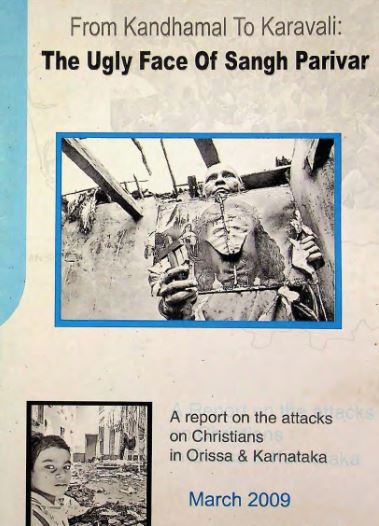The essay book “Ugly Face of Sangh Parivar” published by human rights organizations in 2009 sheds light on the controversial and often troubling actions of the Sangh Parivar, a family of Hindu nationalist organizations in India. The book presents a detailed analysis of the ideologies and activities of the Sangh Parivar and its affiliated groups, highlighting their impact on religious minorities, freedom of expression, and human rights in India.
The Sangh Parivar is a collective term used to describe a network of Hindu nationalist organizations, including the Rashtriya Swayamsevak Sangh (RSS), the Vishwa Hindu Parishad (VHP), and the Bharatiya Janata Party (BJP). These groups have been involved in a number of divisive and discriminatory actions, including the targeting of religious minorities such as Muslims and Christians, the suppression of dissenting voices, and the promotion of a narrow and exclusionary vision of Indian identity
One of the key themes of the essay book is the Sangh Parivar’s role in perpetuating communal violence and hatred in India. The organizations affiliated with the Sangh Parivar have been implicated in numerous instances of religiously motivated violence, including the 2002 Gujarat riots, which resulted in the deaths of over 1,000 people, primarily Muslims. The book highlights the complicity of the Sangh Parivar in stoking communal tensions and inciting violence against religious minorities, and calls for accountability and justice for the victims of such atrocities.
The essay book also discusses the Sangh Parivar’s efforts to curtail freedom of expression and dissent in India. The organizations affiliated with the Sangh Parivar have been known to target journalists, activists, and artists who criticize their policies and actions, often using legal threats, intimidation, and violence to silence opposition. The book documents numerous cases of journalists being harassed, attacked, or even killed for speaking out against the Sangh Parivar, and raises concerns about the chilling effect of such actions on freedom of expression in India.
Furthermore, the book examines the Sangh Parivar’s vision of Indian identity, which is often exclusionary and discriminatory towards religious and cultural minorities. The organizations affiliated with the Sangh Parivar have promoted a narrow and homogenizing view of Indian society, which prioritizes Hindu culture and traditions over the diverse and pluralistic identities that make up the country. This vision of Indian identity has marginalized and oppressed religious minorities, as well as indigenous communities, Dalits, and other marginalized groups, leading to increased social tensions and inequalities in the country.
In conclusion, the essay book “Ugly Face of Sangh Parivar” provides a comprehensive and critical analysis of the ideologies and activities of the Sangh Parivar and its affiliated groups. It highlights the damaging impact of the Sangh Parivar on religious minorities, freedom of expression, and human rights in India, and calls for greater accountability, transparency, and respect for the rights of all individuals, regardless of their religion, caste, or beliefs. The book serves as an important resource for scholars, activists, policymakers, and all those concerned with the promotion of democracy, pluralism, and human rights in India and beyond.
Books Info
| Books name | Ugly Face Of Sangh Parivar, The |
| Author | Human Rights Organisations |
| No Of pages | 66 |
| Publisher | NA |
| Publication | 2009 |
| Printed At | NA |
| Distributor | NA |

